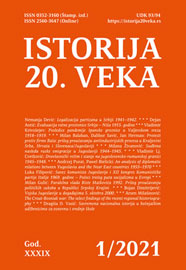PROTESTI PROTIV FIRME BATA: PRILOG PROUČAVANJU ANTIINDUSTRIJSKIH PROCESA U KRALJEVINI SRBA, HRVATA I SLOVENACA/JUGOSLAVIJI
PROTESTS AGAINST THE BATA COMPANY: CONTRIBUTION TO THE STUDY OF ANTI-INDUSTRIAL PROCESSES IN THE KINGDOM OF SERBS, CROATS AND SLOVENES/YUGOSLAVIA
Author(s): Milan Balaban, Dalibor Savić, Jan HermanSubject(s): Social history, Interwar Period (1920 - 1939)
Published by: Institut za savremenu istoriju, Beograd
Keywords: Bata Company;Yugoslavia;Czechoslavakia;Interwar period;Anti-Industrial Protests;Footwear industry;Craftsman;
Summary/Abstract: The paper presents an analysis of the anti-industrial processes in the Kingdom of Serbs, Croats and Slovenes, later the Kingdom of Yugoslavia. In this context, special attention was paid to the protests against the Bata Compa-ny, which by its arrival suppressed domestic industrial and artisan production in the leather industry, i.e. deepened the unfavorable social position of the popula-tion, existentially dependent on domestic footwear production. The Bata Com-pany in Yugoslavia was founded in 1920 and until the end of the decade the retail network grew, but there was still no production, as the footwear and ac-cessories were imported from Czechoslovakia. After the establishment of the Bata became the dominant shoe producer in the en-tire country and covered almost 90 per cent of domestic production and sales. However, during its expansion, the Company was exposed to growing protests from domestic producers and small shoemakers. Those protests lasted almost a decade, peaking at the turn of 1935/1936, by organizing mass demonstrations, which occasionally grew into violent incidents. These protests caused the adop-tion of several measures by the Yugoslav authorities, which limited the business of the company but did not adopt legislation that would take the form of a law, the so-called Lex Bata, which were adopted in Switzerland and France. After that peak, the protests slowly subsided, so that at the end of the decade, Bata completely took over the market of the Kingdom of Yugoslavia.
Journal: Istorija 20. veka
- Issue Year: 2021
- Issue No: 1
- Page Range: 53-76
- Page Count: 24
- Language: Serbian

